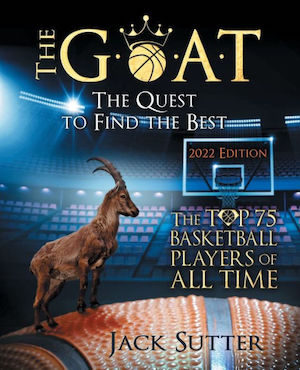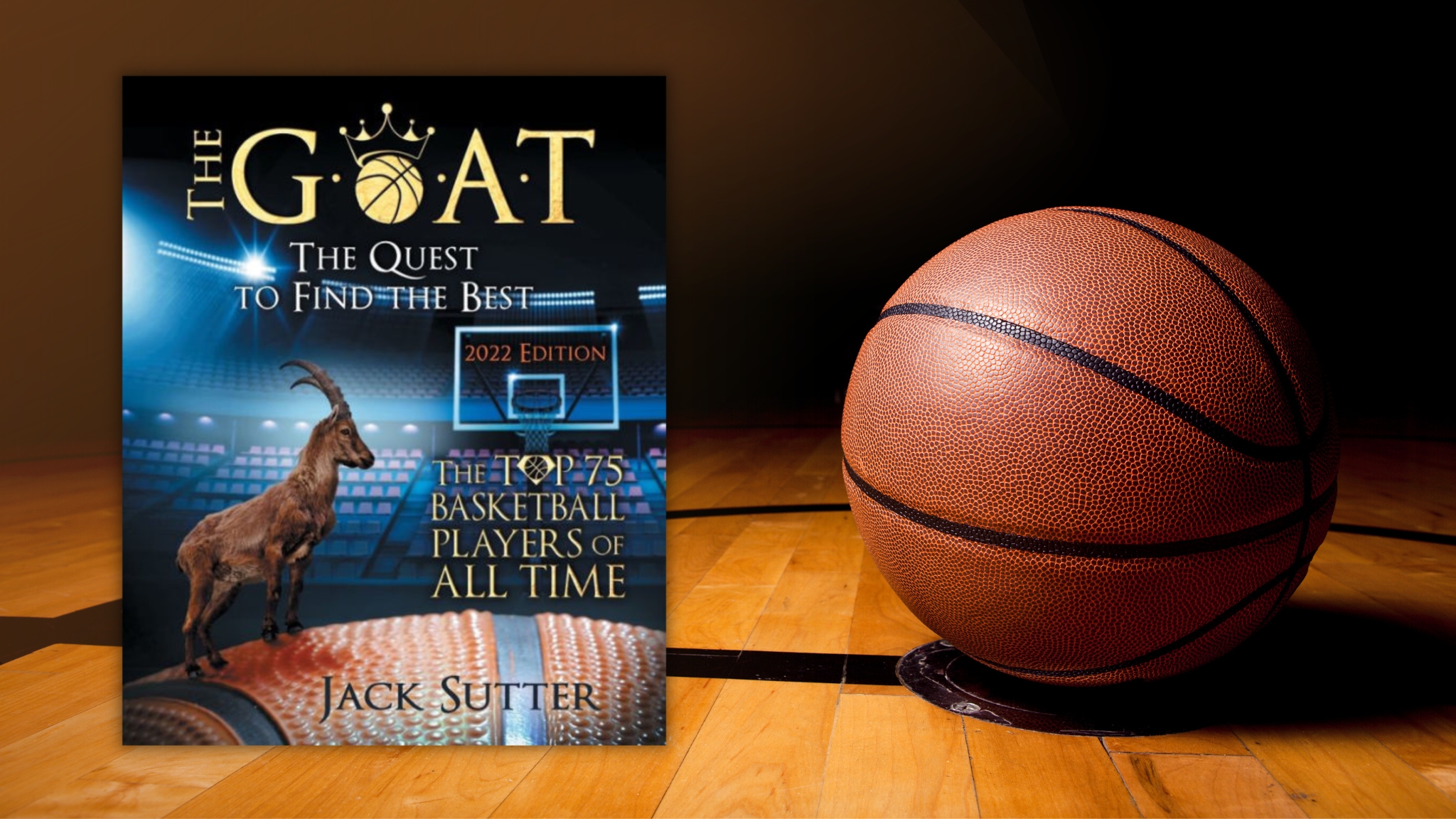The GOAT: The Quest to Find the Best by Jack Sutter
“Greatness is easy to recognize but sometimes hard to define.”
So says Jack Sutter, a longtime basketball fan who has had an up-close view of the game as a small college player and coach. And now, in as methodical a means as you can imagine, he has attempted to put a definition on greatness when it comes to professional athletes who have played for the National Basketball Association in his new book, The G.O.A.T.: The Quest to Find the Best.
The term G.O.A.T. (Greatest of All Time) came into fashion when many pundits labeled Tom Brady the greatest football player of all time. Now Sutter undertakes a similar task as it applies to the game on the hardwood floor — a game, he acknowledges, that has changed greatly over the decades, expanded, recalibrated and now boasts more than 30 men’s teams and an entire league of elite women’s teams and players. His book lists his choices for the top 75 NBA players of all time, culminating with his naming of The G.O.A.T.
Consumers are infatuated with lists — regardless of its nature, topic or validity. Putting names and labels on any subject — the best, the strongest, the richest, the sexiest — really doesn’t matter, because there will be an appetite for it.
In fact, Sutter acknowledges he’s not the first and unlikely the last to compile such a list of basketball greats. That’s probably because sports fans have opinions on almost anything and thrive to engage in spirited argument. Sutter notes that even the NBA itself has picked an all-time team to commemorate its recent 75th anniversary, but he has done his best to tune out all other lists, and the talk of fans and sports talk show hosts — the latter representing an industry that didn’t even exist when Sutter first learned the game – and stick to his rigid criteria.
That criteria consists of 10 gauges: dominance, longevity, offense vs. defense, physicality, statistics, awards and honors, winning, yardstick, clutch and playing both ends of the court. Sutter bases his selections on those measuring sticks, and also offers listings of the top players by decade, special mention of great players whose careers were cut short, and some of the young guns to keep an eye on.
More Than Just a Roster
For any passing basketball fan, naming the top five or 10 should be no great mystery, except perhaps for their order. But as much as naming names and making picks, the great joy in this book is hearing Sutter talk basketball — the game he loves and the players that made an impact on him. Before he even gets to his list, he takes great pains to describe his methodology. And in so doing, he provides marvelous, entertaining anecdotes about so many players that it’s hard not to whet readers’ appetites about exploring his actual picks. He even remembers a time far back when salaries were nothing like the astonishing sums of today, and players actually had to get second jobs to make ends meet.
While the book by its nature deals with individual accomplishment, Sutter is quick to point out basketball is a team sport, and individual greatness is only achievable through the efforts on others in concert. Unselfishness is an important quality in its own right. He quotes the great UCLA basketball coach John Wooden as saying, “It’s amazing how much can be accomplished when no one cares who gets the credit.”
For his part, Sutter says he is attempting to “elevate the debate on who is the greatest of all time in any sport to a level of sanity beyond just a group of fanatics sitting in a bar or a panel of so-called sports gurus arguing their point of view.”
How well has he succeeded? Let the readers be the judge. But whether you agree with Sutter’s picks or not, he already has succeeded in writing a provocative and entertaining book. We encourage you to consider picking up The G.O.A.T.: The Quest to Find the Best for a wonderful, fun, informative and nostalgic ride through one of the most popular sports in the world — by one man who was truly smitten by it from the very beginning.

Jack Sutter fell in love with the game of basketball as an eight-year-old playing on a dirt court in a small town in Southern Illinois. He was the first graduate of Galatia High School to make All-State and earn a basketball scholarship to play in college. He played for three years at Middle Tennessee State University and graduated in 1967. He taught in the public school system in Detroit, Salem, IL and Brandon, FL. He joined the basketball staff at Oral Roberts University in 1970. During a four-year tenure, ORU went from an NAIA school to a Division I program. In 1974 they played in the NCAA Tournament and beat Syracuse and Louisville before losing to Kansas in the Elite Eight. Sutter has coached for 22 years at the D1 level, junior college and high school level. He has played against and coached several players who have played in the NBA.
Buy this Book!
Barnes & Noble





